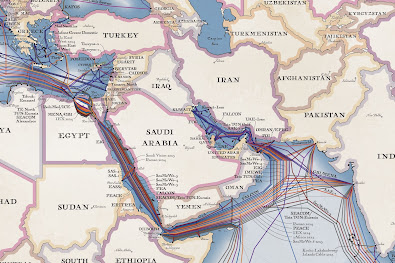Middle East Eye, 5 April 2023
Modern life is dependent on the internet and the hundreds of underwater fibre-optic cables that criss-cross the world, carrying essential digital services from country to country in milliseconds.
Egypt has long enjoyed a dominant role as part of this network: an estimated 17 to 30 percent of all global internet connectivity runs through the Red Sea and across Egypt, linking Europe to Asia. Imagine a digital version of the more visible Suez Canal, which is owned by Egypt and is responsible for 30 percent of all global container traffic.
But, just as a grounded ship in a canal will cause delays, as happened with the Ever Given in March 2021, so Egypt is considered a choke-point by the fibre-optic cable industry due to the lack of alternative routes across a geo-strategically critical part of the world.
Egypt has been able to use this hi-tech bottleneck to its advantage for many years: a fibre-optic cable consultant told MEE, on condition of anonymity for business reasons, that state-owned Telecom Egypt (TE) charges operators the same fees to transit Egyptian territory as other companies charge their clients to go many times that distance from Singapore to the Mediterranean.
Paul Brodsky, senior analyst at telecommunications research firm TeleGeography in Washington, says: “A complaint for a long time has been that Egypt is a single point of failure for cables running between Europe and Asia, the Middle East and East Africa.
“The operator has a monopoly due to the lack of commercial diversity in cable routes. It has been the white whale of the subsea cable business. Is there a way to get away from this dependence?”
Many industry observers believe that the answer, increasingly, is yes.
In September 2020, the Abraham Accords normalised relations between Israel and the UAE and Bahrain, suggesting a potential new route for the cables from the Mediterranean to the Indian Ocean to bypass Egypt. But such a plan would need the cooperation and involvement of Saudi Arabia, which is not a signatory to the deal.
And so, either side of the accords, two cable projects were announced that would run through Israel to Jordan and then, separately, to Saudi Arabia.
These new projects will not unseat Cairo and its market dominance: some 16 cables run across Egypt, with five more on the drawing board. But the fibre-optic map of the Middle East is being re-drawn, with the backing of powerful regional and global actors.
To read the rest go to Middle East Eye

No comments:
Post a Comment